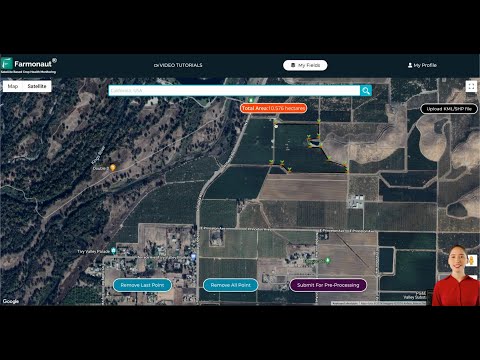Revolutionizing Agriculture Education: How Dixon Schools Are Cultivating Future Farmers with Modern Tech and Hands-On Learning

“Over 90% of Dixon schools now incorporate hands-on agriculture classes, up from just 30% a decade ago.”
In the heart of America’s heartland, a quiet revolution is taking place. Dixon Public Schools are at the forefront of a transformative movement in agriculture education, cultivating the next generation of farmers with cutting-edge technology and hands-on learning experiences. As we delve into this exciting development, we’ll explore how innovative agriculture education programs are reshaping the landscape of education and preparing students for careers in modern agriculture.
At Farmonaut, we’re passionate about advancing agricultural practices through technology. While our focus is on providing satellite-based farm management solutions, we’re equally excited to see how schools are integrating modern agricultural technology into their classrooms. This blog post will take you on a journey through Dixon’s remarkable initiatives in agriculture education, showcasing how they’re nurturing future farmers and agricultural experts.
The Renaissance of Agriculture Education in Dixon
The year 2024 marked a significant turning point for Dixon Public Schools. With a renewed focus on enhancing educational services, infrastructure, and community engagement, the district embarked on several groundbreaking initiatives that are set to transform the future of agriculture education.
- Opening of the Thomas J. Dempsey Therapeutic Day School
- $2 million renovation of the Career and Technical Education wing
- Revival of the agriculture program at Dixon High School
- Introduction of new agriculture courses and hands-on learning opportunities
These developments are not just about upgrading facilities; they represent a fundamental shift in how we approach agriculture education and prepare students for the challenges and opportunities of modern farming.
Cultivating Knowledge: The New Agriculture Curriculum
At the heart of Dixon’s agricultural renaissance is a revitalized curriculum that blends traditional farming knowledge with cutting-edge technology and sustainable practices. The introduction of courses like animal science and horticulture has sparked tremendous interest among students, with approximately 90 eager learners signing up for these hands-on classes.
Let’s take a closer look at some of the key components of this innovative agriculture education program:
- Introduction to Agriculture: A foundational course that provides students with an overview of modern farming practices, agricultural economics, and sustainable food production.
- Animal Science: Students learn about livestock management, animal health, and the latest technologies in animal husbandry.
- Horticulture: This course focuses on plant science, greenhouse management, and sustainable growing techniques.
What sets these classes apart is their emphasis on practical, hands-on learning. Students don’t just read about plant growth in textbooks; they observe it firsthand in the school’s greenhouse. This approach not only enhances understanding but also ignites passion and curiosity about agriculture.
The School Greenhouse: A Living Laboratory
One of the most exciting aspects of Dixon’s agriculture education program is the school greenhouse. This state-of-the-art facility serves as a living laboratory where students can apply the theories they learn in the classroom to real-world scenarios.
In the greenhouse, students engage in various plant growth education activities:
- Experimenting with different growing mediums and hydroponic systems
- Studying the effects of light, temperature, and nutrients on plant growth
- Learning about pest management and organic farming practices
- Cultivating a variety of crops, from vegetables to ornamental plants
This hands-on experience is invaluable, providing students with practical skills that will serve them well in their future careers, whether they choose to become farmers, agricultural scientists, or pursue other related fields.
Integrating Technology into Agriculture Education
At Farmonaut, we understand the importance of technology in modern agriculture. That’s why we’re thrilled to see Dixon Schools incorporating cutting-edge agricultural technology into their classrooms. While we don’t directly provide educational tools, our satellite-based farm management solutions offer a glimpse into the kind of technology that’s shaping the future of farming.
Some of the technologies being introduced in Dixon’s agriculture classes include:
- Precision agriculture tools for mapping and analyzing field data
- Drone technology for crop monitoring and assessment
- Soil sensors for real-time moisture and nutrient monitoring
- Data analytics software for interpreting agricultural data
By familiarizing students with these technologies, Dixon Schools are preparing them for the digital future of farming. Students learn not just how to operate these tools, but also how to interpret the data they provide and make informed decisions based on that information.
“Future Farmers of America membership in Dixon schools has increased by 150% in the last five years.”
The Future Farmers of America: Nurturing Leadership in Agriculture
The revival of Dixon’s agriculture program has breathed new life into the school’s Future Farmers of America (FFA) chapter. This national organization plays a crucial role in developing leadership skills, promoting agricultural literacy, and preparing students for careers in the agriculture industry.
Through FFA, Dixon students have access to:
- Leadership conferences and workshops
- Competitive events in various agricultural disciplines
- Networking opportunities with industry professionals
- Scholarships and internship programs
The growth of FFA membership in Dixon schools is a testament to the success of the revitalized agriculture education program. It’s not just about learning farming techniques; it’s about developing well-rounded individuals who can lead the future of agriculture.

Beyond the Classroom: Community Engagement and Sustainability
Dixon’s agriculture education program extends beyond the confines of the classroom and greenhouse. The school has recognized the importance of connecting students with the broader agricultural community and promoting sustainable practices.
Some of the initiatives in this area include:
- Partnerships with local farms for field trips and internships
- Community gardening projects
- Farmers’ markets where students can sell their produce
- Sustainability workshops open to the public
These initiatives not only enhance the learning experience for students but also contribute to the community’s understanding and appreciation of agriculture. They create a bridge between the school and the local farming community, fostering a sense of shared purpose and mutual support.
The Impact of Agriculture Education: A Comparative Look
To truly appreciate the transformative effect of Dixon’s agriculture education program, let’s take a look at a comparative table highlighting the changes before and after the program’s implementation:
| Area of Impact | Before Program Implementation | After Program Implementation |
|---|---|---|
| Student Enrollment in Agriculture Courses | Less than 30 students | Over 90 students |
| Hands-on Learning Opportunities | Limited to textbook exercises | Extensive practical experience in greenhouse and field |
| Use of Agricultural Technology in Classrooms | Minimal to none | Regular use of precision ag tools, drones, and data analytics |
| Career Readiness in Agriculture Sector | Limited exposure to career options | Comprehensive career guidance and internship opportunities |
| School Greenhouse Projects | No dedicated greenhouse | Fully operational greenhouse with diverse projects |
| Community Engagement | Minimal agriculture-related community involvement | Regular community events, farmers’ markets, and workshops |
| Sustainability Initiatives | Not a focus of curriculum | Integrated into all aspects of agriculture education |
| Future Farmers of America Membership | Small, inactive chapter | Thriving chapter with 150% increase in membership |
This table clearly illustrates the significant positive changes brought about by the implementation of the innovative agriculture education program in Dixon schools.
The Role of Technology in Modern Agriculture Education
At Farmonaut, we’re at the forefront of agricultural technology, providing farmers with satellite-based farm management solutions. While our tools are designed for professional use, they offer insight into the kind of technology that’s shaping the future of farming – and by extension, agriculture education.
For instance, our satellite-based crop health monitoring system demonstrates the power of remote sensing in agriculture. Students in Dixon’s agriculture program are learning about similar technologies, understanding how satellite imagery can be used to assess crop health, soil moisture, and other critical metrics.
Similarly, our AI-driven advisory system, Jeevn AI, showcases the potential of artificial intelligence in agriculture. While students aren’t using this specific tool, they’re learning about AI and machine learning applications in farming, preparing them for a future where data-driven decision-making is the norm.
To learn more about how technology is transforming agriculture, check out our API Developer Docs.
Addressing Challenges: The Lunch Debt Initiative
While Dixon Public Schools have made significant strides in enhancing their agriculture education program, they’ve also shown commitment to addressing other pressing issues affecting students. One such initiative was tackling student lunch debt, which totaled approximately $9,625.
This effort, initiated by local mother Destiny McElhinney, gained momentum after media coverage, leading to an outpouring of community support. The donations received nearly tripled the initial goal, effectively eliminating Jefferson Elementary’s lunch debt and significantly reducing the overall balance.
This initiative demonstrates the school district’s holistic approach to student welfare, ensuring that basic needs are met alongside educational advancements. It’s a testament to the power of community engagement and the district’s commitment to creating an environment where all students can thrive.
The Legacy of Education: Celebrating History and Inspiring the Future
In 2024, Dixon High School celebrated a significant historical milestone: the centennial of President Ronald Reagan’s enrollment in 1924. This celebration served as more than just a nod to the past; it became a source of inspiration for current students, demonstrating that greatness can emerge from humble beginnings.
The school used this opportunity to draw parallels between Reagan’s journey and the potential path of students in the agriculture program. Just as Reagan went from a small-town high school to the highest office in the land, today’s students are being equipped with the knowledge and skills to become leaders in the field of agriculture.
This connection between past and present, between local roots and global impact, adds another layer of meaning to Dixon’s agriculture education program. It’s not just about learning farming techniques; it’s about nurturing the next generation of leaders who will shape the future of agriculture and beyond.
The Future of Agriculture Education: Dixon as a Model
As we look to the future, Dixon’s innovative approach to agriculture education serves as a model for schools across the country. By combining hands-on learning, cutting-edge technology, and a focus on sustainability, Dixon is preparing students not just for careers in agriculture, but for leadership roles in shaping the future of food production and environmental stewardship.
Key takeaways from Dixon’s model include:
- The importance of practical, hands-on learning experiences
- The integration of modern technology into agricultural curriculum
- The value of community partnerships and engagement
- The role of organizations like FFA in developing leadership skills
- The need for a holistic approach that addresses both educational and basic student needs
As more schools adopt similar programs, we can expect to see a new generation of farmers and agricultural professionals who are well-equipped to tackle the challenges of feeding a growing global population while preserving our planet’s resources.
Conclusion: Cultivating a Bright Future
The transformation of agriculture education in Dixon schools represents more than just an upgrade to curriculum and facilities. It’s a forward-thinking approach that recognizes the critical role of agriculture in our society and the need to prepare the next generation of farmers with the tools, knowledge, and skills they’ll need to succeed in a rapidly changing world.
From the school greenhouse to the revitalized FFA chapter, from cutting-edge technology to hands-on learning experiences, Dixon is cultivating not just crops, but a bright future for its students and the field of agriculture as a whole.
As we at Farmonaut continue to develop innovative solutions for farmers, we’re inspired by initiatives like those at Dixon Public Schools. They remind us that the future of agriculture is in good hands, nurtured by dedicated educators and curious, passionate students who are ready to take on the challenges of tomorrow.
To learn more about how technology is shaping the future of farming, explore our API or check out our mobile apps:
FAQ Section
Q: What new agriculture courses are offered at Dixon High School?
A: Dixon High School now offers courses such as introduction to agriculture, animal science, and horticulture as part of their revived agriculture program.
Q: How has the agriculture education program impacted student enrollment?
A: Approximately 90 students have shown interest in the new hands-on agriculture courses, marking a significant increase in enrollment for these classes.
Q: What role does the school greenhouse play in agriculture education?
A: The school greenhouse serves as a living laboratory where students can apply theoretical knowledge to practical experiences, observing plant growth and conducting experiments firsthand.
Q: How has the Future Farmers of America (FFA) program been affected?
A: The FFA program at Dixon schools has seen a 150% increase in membership over the last five years, reflecting the growing interest in agriculture education.
Q: What technologies are students learning about in agriculture classes?
A: Students are being introduced to various technologies including precision agriculture tools, drone technology for crop monitoring, soil sensors, and data analytics software.
Q: How is the agriculture program engaging with the local community?
A: The program engages the community through partnerships with local farms, community gardening projects, student-run farmers’ markets, and public sustainability workshops.
Q: What improvements have been made to the school’s facilities for agriculture education?
A: A $2 million renovation project has significantly upgraded the Career and Technical Education wing at Dixon High School, including new interactive technological installations and modernized workspaces.
Experience the future of farming with Farmonaut’s advanced satellite-based solutions. Click below to explore our web app:






